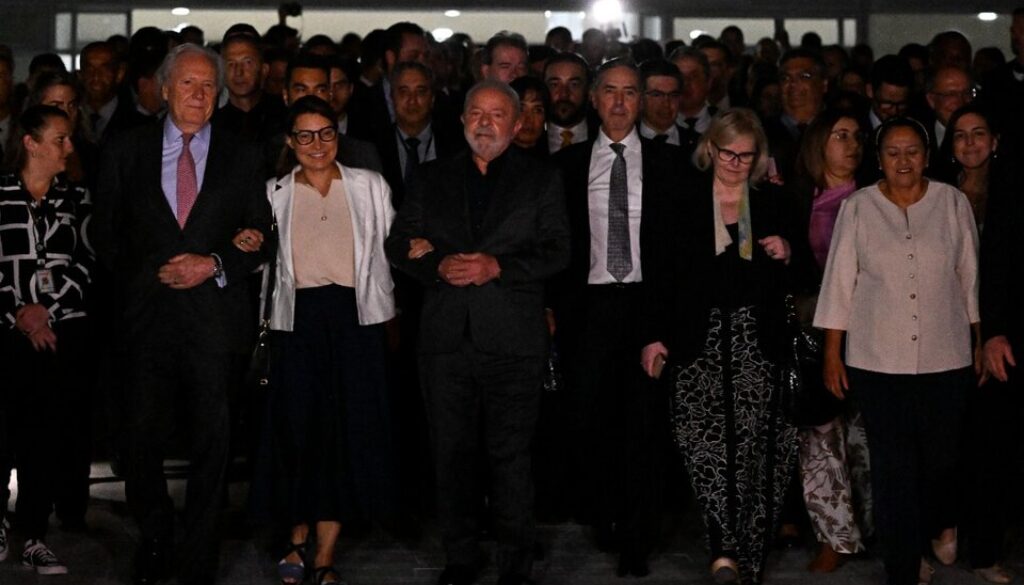Coup, countercoup and Lula’s third victory
Getting your Trinity Audio player ready... |
Six years ago, Brazil’s president Dilma Rousseff was overthrown in a coup d’état. The political trial orchestrated against her involved all the powers of the Brazilian republic, under the command of the then vice-president Michel Temer, who during his illegitimate presidency would initiate a dark period of neoliberal subjugation. Exchanges of leaked messages published by the press at the time showed that the collusion against Dilma was even carried out with the participation of Supreme Court ministers.
During the session that deposed her in Congress, the then extremist federal deputy Jair Bolsonaro, in voting in favour of the impeachment, paid homage to Colonel Brilhante Ustra, a torturer in the Brazilian army and author of a historical review book in defence of the military dictatorship. Between Bolsonaro’s vote and the invasion of the buildings of the three Brazilian powers, we lived through a period of permanent attacks on democracy, under the leadership of the man who would become president of the republic and, defeated by the people, continues to destabilise the country from Miami, United States.
This information is important for us to understand that the scenes we saw last Sunday, of the angry mob of extremists smashing the symbols of the homeland and literally defecating on the institutions, are hyperbole of a process that did not begin yesterday. On the contrary, they can be interpreted as the violent thrashing out of a coup d’état that took place years ago.
This coup, whose purpose was to break the hegemony of the Workers’ Party in the presidency, would not have happened without the hand of other actors who must also be held accountable in this moment of crisis. They are the then judge Sergio Moro, now a senator for a right-wing party; the then prosecutor, Deltan Dallagnol, now a federal deputy for the same right-wing party; a group of generals who left the barracks to act politically, under the baton of General Heleno; the mainstream national media, the intriguing US social media platforms and the gratitude of the global far right. The 2016 coup d’état, anti-democratic as all coups are, led to the imprisonment of Lula, encouraged the murder of Marielle Franco, cornered left and pro-democracy forces for years.
A new and important development, however, is the beginning of the counter-coup.
It begins with the electoral victory of Lula and his broad front for democracy, in the closest presidential run-off in our fragile democratic history. Fast forward to the imposing act of inauguration, in Brasilia, just over a week ago, when the president received the legitimate presidential sash from the hands of our working people (a child, an indigenous, a disabled and a black woman); and it culminates with the descent of the ramp of the Planalto Palace, on Monday 9 January, after holding a meeting attended by the presidents of the other powers (Chamber, Senate and Supreme Federal Court) and the governors of the 27 states with the aim of strengthening democracy.
Lula, who summoned a crowd to walk with him up the palace ramp, walked down it, a day after chaos gripped the country, accompanied by all the country’s institutional forces, including flanked by politicians elected with Bolsonaro’s support. Arm in arm with the president of the STF, Rosa Weber, he paraded through the Praça dos Três Poderes with his head held high. In his speech he emphatically stated that the coup perpetrators will feel the heavy hand of the law and will pay for repeated attacks on democracy.
With these sure moves, Lula not only assumes the responsibility of articulating the counter-coup against Sunday’s episodes, but also puts himself in a position of attack to do justice to the madness brought about by the 2016 coup. For this he has had the essential support of the minister of the Superior Court of Justice, Alexandre de Morares, whose tireless work in defence of democracy has unnerved the Bolsonaristas, especially their leader, who is no longer with us today.
Winner of the 2002, 2006 and 2022 elections, Lula once again proved himself to be the statesman that he is, the only one capable of leading Brazil towards a potential democratic pacification. The task, however, will not be easy. The Atlas opinion poll published this week states that around 20 percent of Brazilians are in favour of cowardly acts of destruction. It is a minority, to be sure, but a minority willing to do anything. Hence the importance of the exemplary reaction, which has already resulted in the arrest of more than 500 people. The investigations also extend to the financiers of the events, and Justice Minister Flávio Dino has already pointed out that most of them are from the states of the South and Centre-West of Brazil, states where Bolsonaro won last year’s elections. The list is likely to include businessmen, politicians and right-wing parties, such as Bolsonaro’s PL.
It is worth noting that the survey points to the magnitude of Brazil’s democratic deficit. Out of earshot, 39.7 percent believe that “Lula did not win” the elections, a similar number (36.8 percent) to those who say they are “in favour of military intervention”. Dictatorship and authoritarianism, so well embodied by Bolsonaro and which took shape after the 2016 coup d’état, continue to lurk. In Brazilian civil society, on the other hand, the “Without Amnesty” movement is now emerging, whose mission is to move the country forward without leaving behind the necessary justice against those who want to hijack our future.
By Rodrigo Savazoni, Executive Director of Instituto Pro Comum (Brazil) and member of CILA.
This article was originally published in Spanish by Página 12 on January 12, 2023.




